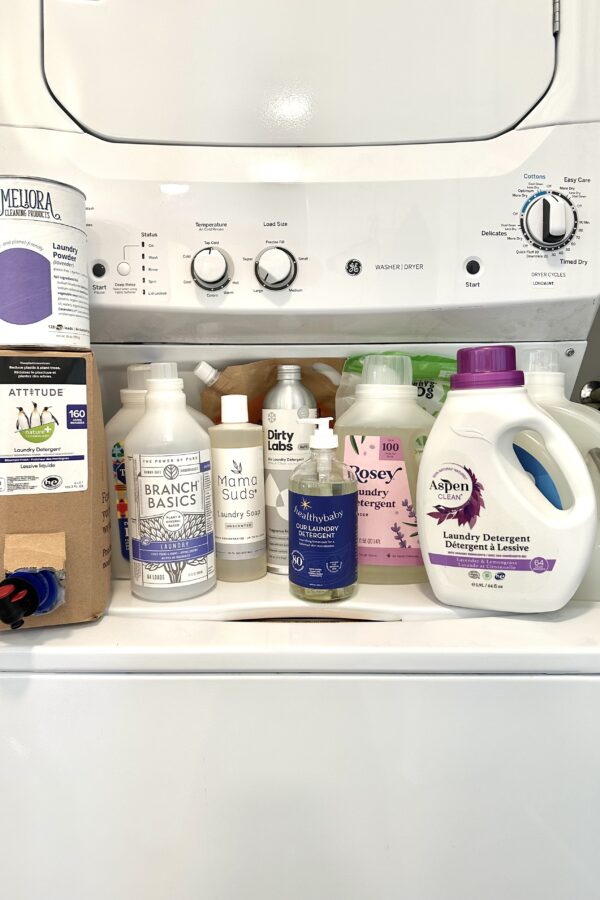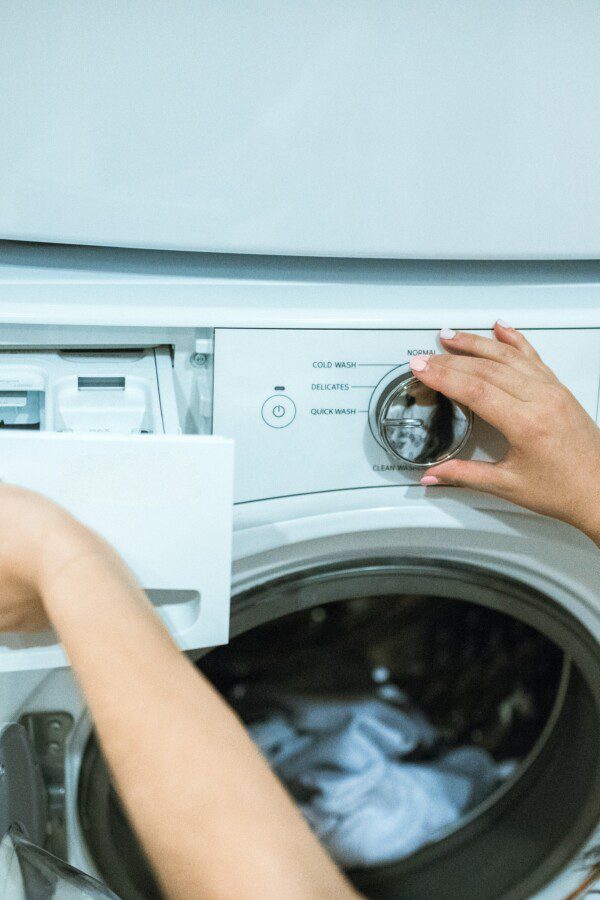As you gather around the dining room table, you should be filling yourself with nourishing food, lively conversations, and the warmth of loved ones, not… formaldehyde!
But yes, sadly, there is usually quite a bit of formaldehyde (and other toxic chemicals) in conventional furniture. So in this article, we’re going to talk about why it’s worth switching to solid wood furniture and what to look for in non-toxic and eco-friendly dining tables and chairs, and then we’ll give your our favorite brands to shop from.
Let’s get to it, shall we?
Table of Contents
This post contains affiliate links, which means we may earn a small commission if you choose to make a purchase. We only make recommendations that are genuine and meet our material standards.
Featured Image Credit: Medley
What to Look for in a Non-Toxic Dining Table
First, here are a few things we look for when picking out non-toxic and eco-friendly furniture:
Solid Wood
We’ve talked about solid wood engineered wood in basically all of our guides to non-toxic wood furniture (bed frames, desks, dressers, etc.). In short, it’s like this: engineered wood (also called MDF, plywood, and a few other terms) is made by gluing a bunch of wood pieces (think wood chips and sawdust) together into a plank that looks like real, solid wood.
But what’s in all of that glue? Most of the time, it’s formaldehyde and other volatile organic compounds (VOCs). Those chemicals can slowly evaporate (or “off-gas”) into your home over time, where they can pose a threat to your health.
That’s the biggest reason why we recommend choosing solid wood for your non-toxic furniture whenever possible.
Solid wood usually ends up making for a much more durable dining table, too. If you and your family are going to be using your kitchen table daily for all things eating, working, doing homework, arts and crafts, playing games, etc… well, you’re going to want something that will stand the test of time! Solid wood is much more likely to be able to do that.
Home
9 Best Non-Toxic Furniture Brands for Your Healthy Home (2024)
In this guide, you’ll learn about what to look for in non-toxic furniture brands, and then we’ll give your our favorite brands to shop from that are using the safest non-toxic materials.
Low- or No- VOC Finishes
The other thing we look at in non-toxic wooden furniture is the finish. Just like the glue holding the table together, the oils, veneers, and lacquers used to finish wooden furniture also commonly contain VOCs.
That’s why we look for things like natural linseed oil or low- or no-VOC synthetic finishes.
Third Party Certifications
You’ll notice that many of the brands we’ve picked out below come with various third-party certifications, such as:
- GREENGUARD, which indicates the product is free from certain VOCs
- Forest Stewardship Council (FSC), which indicates that the wood has been sourced in a resposible manner
- Sustainable Furnishings Council (SFC), which means that the company as a whole is committed to sustainable business practices throughout its processes
- and Fair Trade, which means the people making the furniture are being paid fair wages and working under safe conditions
All of these various labels serve different purposes, and they aren’t always perfect. However, they do provide some accountability for brands and they help to show consumers that the brand and/or product measures up to a certain set of criteria.
The Best Brands for Non-Toxic & Solid Wood Dining Table Sets
Here are our favorite non-toxic furniture companies that are using solid woods, natural finishes, and other safe and sustainable manufacturing processes to make their dining tables and chairs.
Medley

Medley makes several different kinds of natural wood dining table sets, whether you prefer something with sharp lines or a round shape, or whether you like need something small or large, or in between (extendable!).
Medley’s tables are available in light-colored maple wood or dark walnut, and it’s all FSC certified. Medley also uses a few different types of low- and zero-VOC finishes and glues made out of water-based and natural materials such as beeswax. Plus, everything is handcrafted in California, USA.
Use the code THEFILTERY5 for 5% off your order.
Maiden Home

Maiden Home’s dining sets are truly gorgeous. These tables and chairs are handcrafted in the USA out of domestically-sourced solid ash wood. You can choose between six different wood finishes, four different kinds of fabrics, and several different sizes—so you can get exactly what would look and fit best with your space.
All of Maiden Home’s solid wood furniture is made without flame retardants, formaldehyde, or other harmful chemicals. (Note that although their upholstered furniture is made without PFOA and PFOS, it is not free from all PFAS.)
Masaya & Co.

Masaya & Co. is one of our favorite brands for sustainable and ethical furniture. They have a pretty large collection, which includes solid wood dining table sets.
All of their furniture is handcrafted by artisans in Nicaragua using sustainably harvested hardwood and then finished with a water-based, low-VOC finish. Plus, they plant 100 trees with each purchase.
Their dining chairs come in several different colors and patterns, so you could even mix and match a little bit to give your dining room a unique look.
West Elm

West Elm has some really good options—they’ve got large rectangles, small circular tables, expandable and drop-leaf dining tables, glass tops, steel legs, and more. Many of them are a little more affordable than some of the other brands listed here as well.
West Elm does use some engineered wood in several of their pieces, so just make sure you check before purchasing so you know what you’re getting. But a lot of their tables are made out of FSC certified solid wood and are Fair Trade, too.
West Elm has a variety of dining chairs to choose from, too, which are made from various materials such as kiln-dried solid wood, leather, metal, and various fabrics.
Pottery Barn

Even though a lot of Pottery Barn’s furniture is made with engineered MDF wood and other not-great materials, they do have a few good options for solid wood dining tables. Take this Ezra Extending Dining Table, for example. It’s crafted from kiln dried solid pine wood and carries a GREENGUARD Gold certification, indicating it’s been tested to be free from various VOCs.
Not only that, but it’s Fair Trade Certified too, which means it was made under fair and ethical working conditions.
Copeland

Copeland has various sizes and styles of dining table sets that are handmade in Vermont, USA out of solid wood. They offer several different kinds of extension tables along with round glass tops and other shapes.
Even though they do use synthetic finishes on their tables, most of them come with the GREENGUARD certification, which means they contain a smaller amount of VOCs than most other conventional tables. Copeland is also a member of the Sustainable Furnishings Council (SFC).
Conclusion
The next time you’re in the market for a new dining room table set, consider going for solid wood instead of engineered wood and choose companies that use natural and non-toxic finishes like linseed oil. Not only will it mean less off-gassing and decreased indoor air pollution for your and your family, but these tables are also more likely to be more durable and last you a lot longer, too!






Hi! Great article, thank you! We are looking at purchasing an indoor dining table that is made from solid rubber wood and oak veneer. Are these a no no? I’m not familiar with rubber wood but sounds like it is eco friendly but the kiln process is not, but maybe that’s for outdoor furniture? Thank you!
Thank you SO much for your helpful information. It’s really helping me choose intentional pieces for my home. I’ve been interested in the brand De La Espada and also Restoration Hardware. Do you know these brands/would you think they’re non toxic? They do indeed use solid wood, but do not talk about any third party certifications. I do not know what finishes they use for their wood. What are some important questions I can ask to see if they are relatively low VOC? Thanks for your help.
Hi Catherine,
Glad you found the info helpful! We haven’t done a deep dive into either of the furniture brands you mentioned, but after an initial look, De La Espada appears to be a good option. As you said, they use solid wood and it looks like their lacquers are water-based, which is a good sign. You could reach out to them and ask what kind of oils are used to finish (linseed is a common one used for non-toxic & natural finishes). Although third-party certifications are helpful, just because a brand doesn’t have one doesn’t necessarily mean their products are non-toxic; some of these certifications can be expensive to maintain for small brands. I see that De La Espada’s furniture is made in Portugal, which is another good sign since European chemical safety standards tend to be more strict than they are in the US. Some smaller companies like this even allow you to customize your finish, so you could even contact them and put in a request for whichever finish has the lowest VOCs.
RH, I’m not so sure about… Although it appears they do use solid wood, I can’t find any info at all about their finishes, which is usually not a good sign. Third-party certifications tend to be more helpful when it comes to larger companies like RH since a) they tend to have less transparency & oversight over their supply chains, and b) they should be able to afford them.